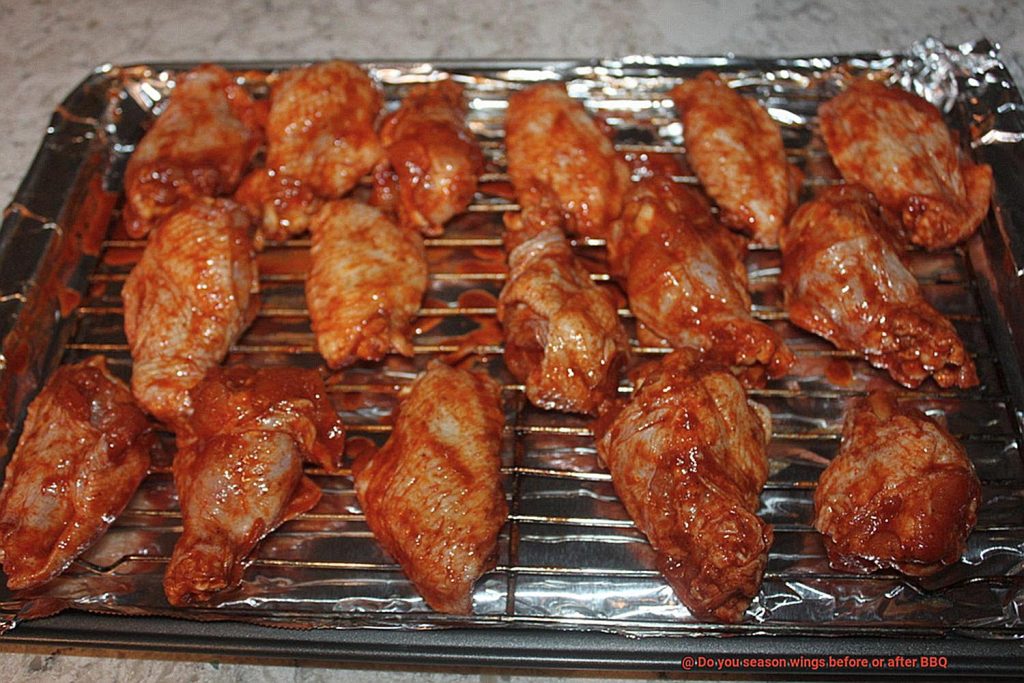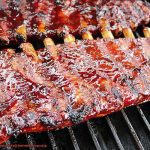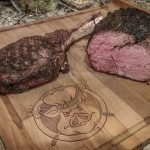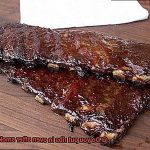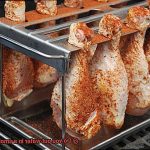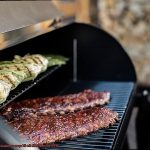Picture this: you’re surrounded by friends, cheering for your favorite team, and the aroma of grilled chicken wings is wafting through the air. Is there anything better? Wings are a staple for any game night or party, and with so many flavor options, it’s easy to see why they’re so popular. But when it comes to seasoning, do you go before or after BBQ?
Grilling fanatics tend to season their wings pre-BBQ, but others argue that post-grilling seasoning is the way to go. It’s a hotly debated topic among foodies, with both sides claiming their method is superior. So what’s the truth? Well, as it turns out, both approaches have their advantages.
Seasoning before cooking allows the flavors to seep into the meat and marinate for maximum flavor explosion. Conversely, seasoning after cooking can help keep the spices fresh and bold while enhancing the overall taste of your wings.
In this blog post, we’ll delve into the pros and cons of both seasoning methods and provide tips on how to achieve optimal results no matter which route you choose. So whether you’re Team Pre-BBQ or Team Post-BBQ, we’ve got you covered. Get ready to master the art of juicy barbecue chicken wings with our expert tips and tricks.
Contents
The Benefits of Seasoning Wings Before Cooking
If you’re a fan of grilled wings, you know that seasoning them is a crucial step to enhance their flavor and texture. But did you know that seasoning wings before cooking has many benefits that can take your grilling game to the next level?
Firstly, seasoning wings before cooking creates more flavorful wings. When you season the meat beforehand, it allows the flavors to seep into the meat and penetrate deep inside, making every bite flavorful. No more worrying about bland or unevenly seasoned wings.
Secondly, seasoning wings before cooking helps to achieve a better texture. The seasoning helps to tenderize the meat, making it juicier and more succulent. You’ll enjoy moist and tender chicken with a burst of flavor in every bite.
Thirdly, seasoning wings before cooking reduces the reliance on sauces. When you add seasoning before cooking, it eliminates the need for excess amounts of sauce to add flavor. This means that you can enjoy the natural taste of the chicken without overpowering it with too much sauce.
Fourthly, seasoning wings before cooking is customizable to your personal taste preferences. You can experiment with various combinations of herbs and spices to create your unique flavor profile. Create sweet, savory, or spicy variations of your favorite seasonings to make your wings stand out from the crowd.
Lastly, seasoning wings before cooking saves valuable time in the kitchen. It eliminates the need for marinating the wings for an extended period, which can take up valuable time. This way, you can spend more time enjoying your delicious grilled wings rather than waiting for them to marinate.
Using Dry Rubs for Seasoning Wings
As an expert in using dry rubs for seasoning wings, I’m here to share my tips and tricks for creating mouth-watering, flavorful wings that will have your taste buds dancing.
First and foremost, start with clean, dry wings. This is crucial for ensuring that the dry rub adheres well to the meat’s surface. Take the time to pat them dry with paper towels and then generously coat them with your chosen dry rub. Use your hands to massage the rub into every nook and cranny of the wings, ensuring maximum coverage.
When it comes to choosing your dry rub ingredients, the options are endless. Popular choices include paprika, garlic powder, onion powder, cumin, chili powder, and brown sugar. But don’t be afraid to get creative and create your own unique blend. A little experimentation can go a long way in creating a flavor profile that’s truly your own.
Once you’ve coated your wings in the dry rub, let them sit for at least 30 minutes before grilling or BBQing. This gives the flavors time to penetrate the meat and create a delicious crust on the outside of the wings. For even more flavor infusion, consider letting them marinate in the fridge overnight.
When it’s time to grill or BBQ your wings, cook them over medium heat until they’re crispy on the outside and juicy on the inside. And don’t forget about the dipping sauces. Whether it’s classic buffalo sauce or something more adventurous like honey mustard or ranch, a good dip can take your wings to the next level.
Using Marinades for Seasoning Wings
Using marinades for seasoning wings is a popular and delicious way to do just that. As an expert in the art of seasoning wings, I’m here to share some tips on how to make the most out of your marinade.
First and foremost, choosing the right marinade is essential. You want a marinade that complements the flavors of your wings. For example, if you’re grilling up some buffalo wings, a spicy marinade with cayenne pepper and hot sauce would be perfect. For a sweet and savory option, try a teriyaki marinade. The options are endless, so don’t be afraid to get creative.
When it comes to the acidity level of your marinade, it’s important to be mindful. Acids like vinegar, citrus juice, and wine can help tenderize the meat by breaking down its fibers. However, leaving your wings in an acidic marinade for too long can lead to mushy and undesirable results. Follow the instructions on your recipe and marinate for a maximum of two to four hours.
Before grilling your wings, ensure they are fully coated in the marinade. This will help prevent them from drying out during cooking and ensure even seasoning.
The Benefits of Seasoning Wings After Cooking
While both methods have their merits, there are some compelling reasons why seasoning wings after cooking is the better approach.
One of the most significant benefits of seasoning wings after cooking is greater control over the flavor. When you season before cooking, the heat can cause the seasoning to burn or become too intense, leaving you with wings that are almost inedible. On the other hand, seasoning after cooking allows you to taste the wings and adjust the seasoning as needed. This gives you complete control over the flavor profile, resulting in perfectly seasoned wings every time.
But it’s not just about flavor; seasoning wings after cooking can also help preserve their texture. When you season before cooking, the salt in the seasoning can draw out moisture from the meat, leaving you with dry and tough wings. By seasoning after cooking, you can avoid this issue and keep your wings juicy and tender.
Finally, seasoning after cooking is also more practical and convenient. When grilling or smoking wings, adding seasoning can be tricky without disrupting the cooking process. But by waiting until your wings are cooked, you can take your time and season them without any distractions or interruptions.
Using Sauces to Enhance Flavor
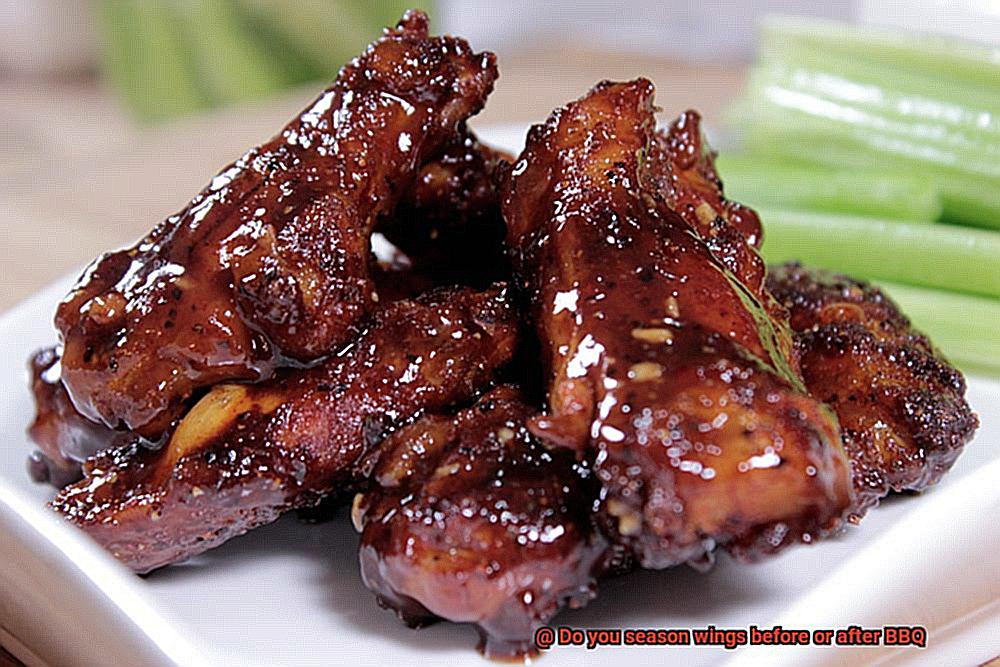
Calling all grill masters. Are you ready to elevate your wing game? Using sauces to enhance the flavor of wings is a popular technique that can take your wings from good to great. The right sauce can add an explosion of flavor that complements your wings perfectly.
There are countless sauces available, ranging from sweet and tangy to spicy and savory. While BBQ sauce is a classic choice, why not experiment with hot sauce, teriyaki sauce, honey mustard, or even fruit-based sauces like mango habanero for a unique twist?
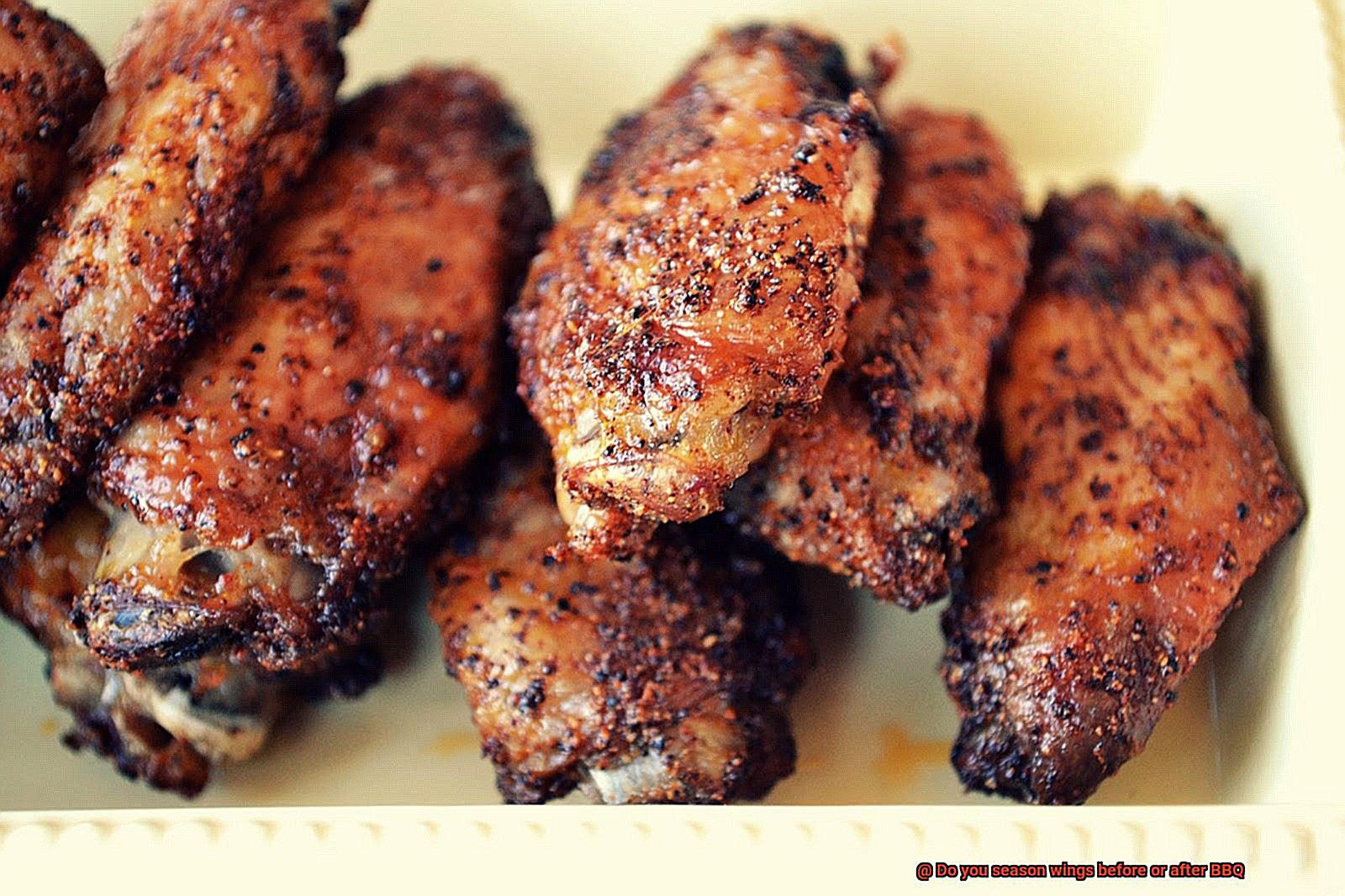
Now, let’s dive into some sub-topics on how to use sauces to enhance the flavor of your wings:
Choose a sauce that complements your wings: It’s important to choose a sauce that enhances the natural flavors of the meat rather than overpowering them. For example, if you’re grilling spicy wings, try pairing them with a sweet or tangy sauce to balance out the heat.
Experiment with different sauces and flavor combinations: Don’t be afraid to mix and match different sauces until you find the perfect match for your taste buds. You never know what delicious combination you might discover.
Less is often more: While it can be tempting to slather on the sauce, remember that too much sauce can drown out the natural flavors of the meat. A light coating is all you need to enhance the flavor and add moisture.
Avoiding Over-Seasoning
I have some tips and tricks that will help ensure that your wings are perfectly seasoned every time.
First and foremost, using a balanced rub or marinade is crucial. You want to ensure that no single ingredient overpowers the rest, resulting in a delicious and well-rounded flavor. To achieve this, make sure to taste test your rub or marinade before applying it to your wings. This way, you can adjust the seasoning to your liking and avoid over-seasoning.
Another helpful tip is to apply seasoning in layers. Start by seasoning your wings lightly, grill them up, and then add more seasoning if needed. This way, you can build up the flavor without going overboard. Remember, it’s always better to start with less seasoning and add more as needed.
It’s also important to be mindful of the potency of certain seasonings. Cayenne pepper and chili powder can be very spicy and should be used sparingly. On the other hand, garlic powder and onion powder are milder and can be used more liberally.
To summarize, achieving perfectly seasoned wings requires using a balanced rub or marinade, tasting before applying, applying seasoning in layers, and being mindful of the potency of certain seasonings. By following these tips, you’ll never have to worry about over-seasoning again.
In addition to these tips, here are a few other things to keep in mind when seasoning wings:
Experimentation and Personal Preference
Experimentation and personal preference are the keys to unlocking the perfect balance of flavor.
Seasoning your wings before grilling allows the flavors to infuse into the meat as it cooks. This results in a more succulent and flavorful wing. While some seasonings may burn on the grill, there are options that won’t, such as garlic powder, onion powder, and paprika.
On the other hand, seasoning after cooking allows for greater control over the amount of seasoning on each individual wing. This is especially handy when catering to a crowd with varying taste preferences. Guests can add as much or as little seasoning as they desire.
The beauty of this debate lies in the fact that there is no right or wrong answer – it all comes down to personal preference and experimentation. So why not try both methods and see which one tickles your taste buds? You could even experiment with different seasoning blends to find your ideal flavor combination.
Regardless of which method you choose, remember to use only high-quality ingredients and cook your wings to perfection. This will guarantee maximum flavor and a satisfied palate.
igQcEBduPYM” >
Conclusion
In the great debate of whether to season wings before or after BBQ, there is no clear-cut winner. Both methods have their advantages and it all comes down to personal preference. If you’re looking for maximum flavor infusion and tenderization of the meat, seasoning before cooking is the way to go. On the other hand, seasoning after cooking provides greater control over the amount of seasoning on each wing and preserves texture.
To take your wings to the next level, try using dry rubs or marinades to enhance their flavor profile. And don’t forget about sauces. A perfectly paired sauce can add an explosion of flavor that complements your wings perfectly.
But how do you avoid over-seasoning? It’s all about balance. Use a balanced rub or marinade, apply seasoning in layers, taste before applying, and be mindful of the potency of certain seasonings. Experiment with different blends until you find your ideal flavor combination.
At the end of the day, achieving perfectly seasoned wings is an art form that requires experimentation and attention to detail. Whether you’re Team Pre-BBQ or Team Post-BBQ, use high-quality ingredients and cook your wings to perfection for maximum flavor and a satisfied palate.

